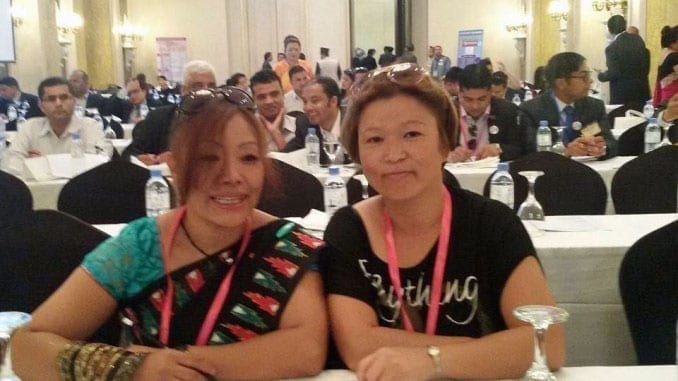Some two dozen human rights organizations are condemning the detention of two Nepali domestic workers in Lebanon, one of whom was deported.
Sushila Rana and Roja Maya Limbu were detained “without formal and clear explanation of the charges levelled against them,” according to the International Domestic Workers Federation (IDWF). Rana was deported December 10 (International Human Rights Day), while Limbu has been detained for more than a week without access to a lawyer.
(Your organization can sign the joint statement by IDWF, the International Trade Union Confederation (ITUC), Human Rights Watch and other human rights organizations.)

Sushila Rana and Roja Maya Limbu spoke at the founding congress of the domestic workers’ union in Lebanon in January 2015. Credit: IDWF
The two woman helped found the domestic workers’ union in Lebanon in January 2015.
“This is a serious violation of basic human rights and (the International Labor Organization’s) core conventions on the right to organize and on freedom of association,” says Myrtle Witbooi, IDWF president. “We also call on the government of Lebanon to observe and abide by Article 9 of the International Covenant on Civil and Political Rights (ICCPR), which ensures the right to be free from arbitrary arrest and detention.”
Migrant Workers Exploited, Have Few Rights
Migrant workers to the Middle East are rarely protected by labor laws and generally denied the ability to exercise fundamental human rights, including freedom of association, which makes them vulnerable to exploitation and abuse, according to a recent report by the United Nations Special Rapporteur on freedom of assembly and of association. Migrant domestic workers in Lebanon commonly report non-payment of wages, forced confinement, employers’ refusal to provide time off, and verbal and physical abuse.
Like most migrant workers around the world, many are forced to go into debt to pay excessive fees to labor brokers to obtain the jobs. Once in the country, they are governed by the repressive kafala system, which ties a domestic workers’ visa and work permit to one employer. Kafala results in situations where employers have unchecked control over migrant workers, exposing the latter to greater risk of exploitation and abuse.
Freedom of movement for the estimated 250,000 migrant domestic workers in Lebanon is restricted by employers who take workers’ passports and laws that limit their access to public places like restaurants, unless accompanied by their employer.
A 2010 Human Rights Watch report said that migrant domestic workers in Lebanon were dying of unnatural causes at a rate of one per week. Most of the deaths were attributed to suicide — many of the victims were falling from buildings while apparently trying to escape their employers.

